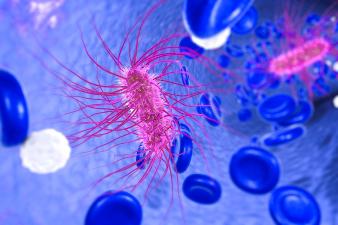Focus Area: Medical Countermeasures and Preparedness for Emerging Infectious Diseases
Importance to FDA
Medical countermeasures, or MCMs, are FDA-regulated products (biological products, drugs, devices) that may be used to diagnose, prevent, mitigate, or treat conditions associated with a potential public health emergency stemming from a terrorist attack with a chemical, biological, radiological, or nuclear (CBRN) material, or a naturally occurring emerging disease (e.g., COVID-19 and pandemic influenza). FDA is responsible for reviewing the safety, effectiveness, and quality of MCMs and contributes its regulatory science expertise to address priorities of the Public Health Emergency Medical Countermeasures Enterprise, a coordinated cross-U.S. government effort working to enhance CBRN preparedness including those against emerging infectious diseases. FDA also works closely with the U.S. Department of Defense (DoD) to facilitate the development and availability of MCMs to support the unique needs of American military personnel, including a framework established in fiscal year 2018 under Public Law 115-92 for enhanced FDA/DoD collaborations. In 2010, FDA launched its Medical Countermeasures Initiative Program, building on the substantive MCM work ongoing at FDA and focusing increased resources on promoting the development of MCMs by establishing clear regulatory pathways for MCMs, instituting effective regulatory policies and mechanisms to facilitate timely access to available MCMs, and advancing MCM regulatory science to create the tools that support timely regulatory decision-making.
Developing MCMs often presents unique challenges. For example, commercial markets generally lack the incentive to develop MCMs. Further, limited exposure to threat agents, such as anthrax, often makes it difficult to generate the necessary data from traditional clinical trials to support regulatory review and decision-making. In some cases, clinical trials may not be feasible or are unethical. In these cases, it may be necessary to use data from adequate and well-controlled animal efficacy studies under regulations commonly known as the Animal Rule (applicable only to certain products regulated by the Center for Biologics Evaluation and Research and Center for Drug Evaluation and Research). Additional challenges include ethical considerations for participation in clinical trials for special populations (e.g., pregnant women and children). FDA researchers respond to these challenges by applying innovative science and developing standards, tools, and strategic approaches to support safe and effective MCMs.
Examples
- Developing reference materials to facilitate evaluation of specific and sensitive diagnostic devices for emergent viruses (e.g., SARS-CoV-2 and Zika virus).
- Conducting studies to apply systems biology and machine learning approaches to strengthen models of coronavirus disease.
- Characterizing coronavirus (SARS-CoV-2/variants, SARS-CoV, and MERS-CoV,) host-pathogen responses to identify biomarkers of disease progression and severity.
- Developing novel analytical tools for quality control for next-generation sequencing databases (e.g., FDA ARGOS).
- Describing pathogenicity and immunity to Ebola and SARS-CoV-2 in nonclinical and clinical studies.
- Explaining host factors contributing to immune responses to Zika, Ebola, and SARS-CoV-2 to more rapidly predict patient outcomes and addressing health care needs of diverse patient populations
- Characterize the natural immunity in Ebola Virus Disease (EVD) and Marburg Virus Disease (MVD) survivors as well as the durability and correlates of vaccine-induced immunity to EVD
- Evaluating the quality of the immune response, including cross-reactive protection of potential universal influenza vaccines.
- Developing and evaluating a variety of microphysiological systems to use as tools to support development of MCMs for acute radiation syndrome (radiation sickness) and COVID-19.
- Developing methods to detect African swine fever virus in animal food and food components.
- Developed and validated two methods to detect and quantify alcohols and impurities in gel and liquid hand sanitizers during the COVID-19 pandemic. The methods, which are capable of simultaneously identifying multiple alcohols, represent a significant improvement over the existing technology, and were applied to hundreds of hand sanitizer samples that were suspected to be adulterated with unacceptable alcohols, such as methanol. The laboratory findings resulted in recalls, warning letters, import alerts, and placement of products on FDA’s list of hand sanitizers that consumers should not use. This research provided a substantial improvement both in throughput and multi-analyte detection, consistent with the needs of a national emergency scenario.
- Conducting research to characterize patients with cancer after recovery from COVID-19, and investigating COVID-19 sequelae, vaccination, breakthrough infections, and the potential impact of COVID infection on treatment and safety of approved medical products.
- Qualified an animal model to demonstrate the efficacy of therapeutics for treatment or post-exposure prophylaxis of pneumonic tularemia. This was the first animal model qualified under the FDA Animal Model Qualification Program.
- Expanding the CURE ID platform (developed by FDA and NCATS) to allow automated data collection from electronic health records (EHR) worldwide and clinical disease registries for COVID-19 and other difficult-to-treat infectious diseases. The Critical Path Institute is convening a public-private partnership (CURE Drug Repurposing Collaboratory). Health care providers and researchers interested in patient-centered outcomes research for COVID-19 and other infectious diseases would have access to comprehensive (de-identified) case reports on potentially tens of thousands of patients, including treatment outcomes, such as recovery, deterioration, hospitalization, ICU admission, and death.
- Completed studies to develop methods for respirator decontamination and reuse in emergencies, which resulted in the first consensus standard for UV surface decontamination and provided data to support EUA of the CCDS Critical Decontamination System used to reduce N95 shortages during the COVID-19 public health emergency.
- Leveraged the Sentinel System to inform study protocols to evaluate safety and effectiveness of MCMs for influenza and COVID-19, and provide a baseline for comparison during a public health emergency.
- Completed studies that enhanced understanding of Ebola and COVID-19 host-pathogen responses to support MCM development.
- Completed studies characterizing immune responses to Ebola and SARS-COV-2 in vaccinated and infected individuals inform vaccine development and review.
- Completed high-quality sequencing of over 1000 bacterial, viral, and fungal organisms to be added to the FDA ARGOS database.
| Minority Health and Health Equity | Women’s Health | Maternal Health | Pediatric Health |
| Oncology | Rare Diseases | One Health Initiative |
Research Capabilities, Tools, and Resources
| Research Management and Collaborations | Technology Transfer and Public-Private Partnerships | Physical Standards and Reference Materials | Intramural Grant Programs | Extramural Funding Mechanisms |
Scientific Education, Training, and Communication
| Fellowship and Training Opportunities | Professional Development and Continuing Education | Communication and External Meetings |
Infrastructure
| Facilities and Shared Resources | Safety and Compliance |
| Office of the Chief Scientist | Contact Us: FARS@fda.hhs.gov |




